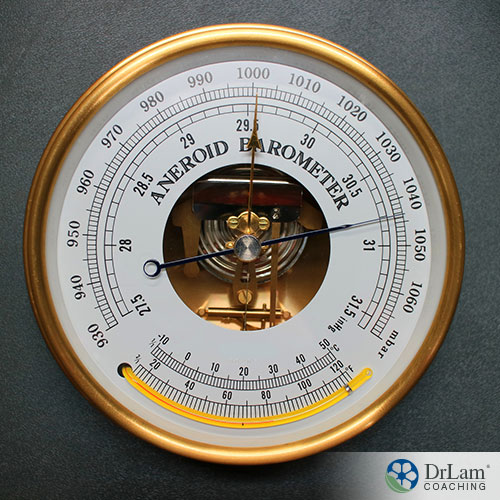 Weather has long played an important role in our daily lives. Hot or cold temperatures affect your body in a variety of ways, but there is another factor that is often overlooked. The changes in barometric pressure can also affect your body and health.
Weather has long played an important role in our daily lives. Hot or cold temperatures affect your body in a variety of ways, but there is another factor that is often overlooked. The changes in barometric pressure can also affect your body and health.
Barometric pressure is the weight of the atmosphere, or the atmospheric pressure. You can also think of it as the “weight of the air." This pressure can be measured by an instrument called a barometer. Its measurement can be communicated in terms of inches (in), millibars (mbar), or millimeters of mercury (mm Hg).
We will explore a few of the ways that changes in the weather and barometric pressure may affect your wellbeing.
A University of Cincinnati study indicates that migraine attacks are most likely sparked by environmental changes. Between thirty to fifty percent of migraine patients believe that weather changes trigger their symptoms. However some persons may not be aware that they suffer from weather triggers.
Changes in barometric pressure have been reported as the most common type of weather triggers. This increased atmospheric pressure leads to worsening sinus conditions. Your sinuses consist of air pockets which normally have an equal distribution of pressure. So when there are changes in the external atmospheric pressure, then there are also changes in the pressure in your sinuses. This in turn leads to a migraine.
Another migraine trigger is a change in the temperature. Sudden switches from hot to cold (or the reverse) can also result in a migraine attack.
Changes in the barometric pressure also have a significant impact on your blood pressure. Your heart is a part of your circulatory mechanism, and it works like a pump. Meanwhile, your veins and arteries act as pipes which transport blood and oxygen all over your body. Your blood pressure also influences the strength and rate of your heart beats and the state of your blood vessels.
When the weather is cold, your blood vessels constrict. This makes it harder for the blood to circulate through them, and increases your blood pressure. So a quick weather change may also lead to spikes in your blood pressure. This is even more so for persons who are 65 years and older.
Persons who struggle with Adrenal Fatigue Syndrome (AFS) often suffer from lower blood pressure. They may experience symptoms such as dizziness, and a sensation of feeling lightheaded or faint. It is important to note that changes in weather can further worsen these symptoms.
A cold front means a drop in barometric pressure. The impact on your body may result in your blood thickening. This leads to greater resistance in your circulation process.
As a result, there is a speedy decline in your blood sugar level. For a person with responsive hypoglycemia this quick reduction of blood sugar in the body is disruptive. The effect is similar to consuming high glucose foods and experiencing a sugar crash afterwards. So monitoring your diet during adverse weather is vital.
For diabetics, it’s important to take note of impending weather changes. These persons should also ensure that the appropriate treatments are readily available. This vigilance is also essential for those who suffer from adrenal fatigue.
A Boston Medical Center survey of 200 patients with knee osteoarthritis discovered that weather changes trigger pain. Specifically, they found a connection between changes in barometric pressure and ambient temperature, and differences in the severity of knee pain.
It may not be easy to see the link between a declining barometer reading and worsening arthritis and joint pain. However, the relationship between the two appears to be valid. Changes in atmospheric pressure may affect the resistance of fluids in the joints. This then activates the pain reactions of the nerves in your joints.
Some people can predict changes in atmospheric pressure based on their body signals. Persons who have osteoarthritis are likely to have greater sensitivity to weather changes, as they suffer from fluctuating joint pains. While you can’t control the weather, you can plan ahead to counter the symptoms that you may experience from adverse weather conditions.
Cold air is not agreeable with asthma and allergy symptoms for a number of reasons.
Increases in humidity and hot weather aggravate these symptoms as they may prevent easy breathing. The adverse effects of air pollution and pollen dust are also likely to increase during the warm months.
Respiratory passages tend to get inflamed from these environmental changes. Inflammation is a major component in the NeuroEndoMetabolic (NEM) Stress Response. In fact it is one of the 6 circuits involved in that response. As such, times of seasonal change may often be more difficult for people with adrenal fatigue.
Therefore it is important to manage inflammation levels during these key months. It’s best to be prepared with your allergy treatments to alleviate these symptoms.
 It is widely agreed that there is an increase in common colds and flu during cold months. Changes in barometric pressure provide the ideal cold weather environment that increases the transmission of the cold virus.
It is widely agreed that there is an increase in common colds and flu during cold months. Changes in barometric pressure provide the ideal cold weather environment that increases the transmission of the cold virus.
If you are under a lot of stress, then this increases the cortisol levels in your body, which suppresses your immunity. With a compromised immune system, you have a lower resistance to viruses, and you are more likely to get ill.
Therefore it is best to remain warm and dry in the colder seasons.
These are just a few ways that fluctuations in barometric pressure may affect your health. It is important to know how your body reacts to weather changes so you can take steps to alleviate any symptoms that may arise.
© Copyright 2020 Michael Lam, M.D. All Rights Reserved.
The link between barometric pressure and adverse physical symptoms may not be quite obvious. Studies have shown that changes in atmospheric pressure can impact your stress level and your health. But it’s possible to alleviate some of these symptoms and improve your wellbeing.
